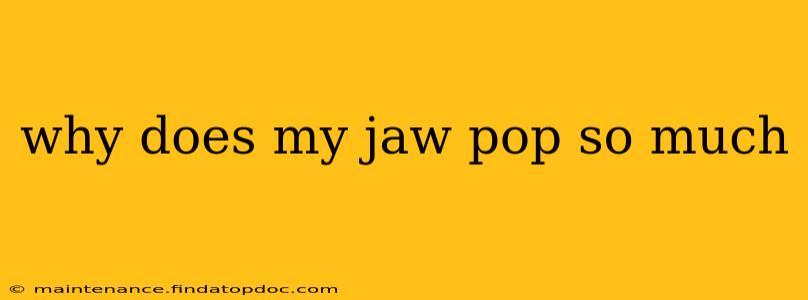Experiencing frequent jaw popping can be unsettling and even painful. This common issue, often associated with temporomandibular joint (TMJ) disorders, can stem from a variety of causes. Understanding these causes and available treatments is crucial for managing this condition and improving your quality of life. This article delves into the reasons behind jaw popping, exploring potential causes, associated symptoms, and effective treatment options.
What Causes My Jaw to Pop?
The popping sound you hear is often the result of a problem with your temporomandibular joint (TMJ), the hinge connecting your jawbone to your skull. Several factors can contribute to this popping:
- Dislocation of the articular disc: The articular disc is a cartilage cushion between the jawbone and the skull. If this disc becomes displaced or misaligned, it can cause a popping or clicking sound as the jaw moves. This is a common cause of TMJ disorders.
- Ligament laxity: Loose ligaments in the TMJ can allow for excessive movement, leading to joint instability and popping sounds.
- Joint inflammation: Arthritis or other inflammatory conditions affecting the TMJ can cause pain, stiffness, and popping.
- Muscle spasms: Tight or spasming muscles surrounding the TMJ can also contribute to popping and clicking sounds. Stress and clenching or grinding your teeth (bruxism) are often contributing factors.
- Degenerative joint disease: Over time, the cartilage in the TMJ can wear down, leading to osteoarthritis and associated popping and clicking sounds.
Does Jaw Popping Always Indicate a Problem?
Not all jaw popping indicates a significant problem. Occasional popping without pain or other symptoms might be perfectly normal. However, persistent popping, accompanied by pain, locking, clicking, or limited jaw movement, warrants a visit to a healthcare professional.
What Other Symptoms Might I Experience with Jaw Popping?
It's important to note that jaw popping rarely occurs in isolation. Other symptoms associated with TMJ disorders include:
- Pain in the jaw, temples, or face: This pain can range from mild discomfort to severe throbbing.
- Headaches: TMJ disorders are frequently linked to headaches, particularly those that are tension-type or migraine.
- Earaches: Pain or discomfort in the ear can be a symptom of TMJ problems.
- Neck pain: Muscle tension in the neck often accompanies TMJ disorders.
- Difficulty chewing or opening your mouth wide: This limited range of motion is a common symptom.
- Clicking or grinding sounds in the jaw: While popping is common, clicking or grinding can also occur.
What Can I Do to Reduce Jaw Popping?
While self-treatment isn't a replacement for professional medical advice, certain lifestyle adjustments can help manage jaw popping:
- Stress management: Techniques such as yoga, meditation, or deep breathing exercises can help reduce muscle tension associated with TMJ disorders.
- Avoid jaw clenching and grinding: Be mindful of your jaw position and consciously relax your jaw muscles throughout the day. Consider using a mouthguard at night if you grind your teeth.
- Maintain good posture: Proper posture reduces strain on the jaw and neck muscles.
- Gentle jaw stretches and exercises: These can help improve flexibility and reduce muscle tension (consult a physical therapist or dentist for guidance).
- Heat or ice packs: Applying heat or ice packs to the jaw can help relieve pain and inflammation.
When Should I See a Doctor or Dentist About My Jaw Popping?
You should seek professional medical attention if:
- Your jaw popping is accompanied by significant pain.
- Your jaw locks or gets stuck.
- You experience limited jaw movement.
- Your symptoms are worsening.
- Over-the-counter pain relievers don't provide relief.
How is Jaw Popping Diagnosed and Treated?
Diagnosis typically involves a physical examination of your jaw and possibly imaging tests like X-rays or MRI scans. Treatment options depend on the underlying cause and severity of your symptoms and may include:
- Pain relievers and anti-inflammatory medications: Over-the-counter or prescription medications can help manage pain and inflammation.
- Physical therapy: Exercises and stretches can improve jaw mobility and reduce muscle tension.
- Splints or mouthguards: These appliances can help realign the jaw and protect teeth from grinding.
- Injections: Corticosteroid injections can help reduce inflammation in the joint.
- Surgery: In severe cases, surgery may be necessary to repair the joint or disc.
This information is for general knowledge and does not constitute medical advice. Always consult with a healthcare professional or dentist for proper diagnosis and treatment of jaw popping or any TMJ-related issues. They can accurately assess your specific situation and recommend the best course of action.
